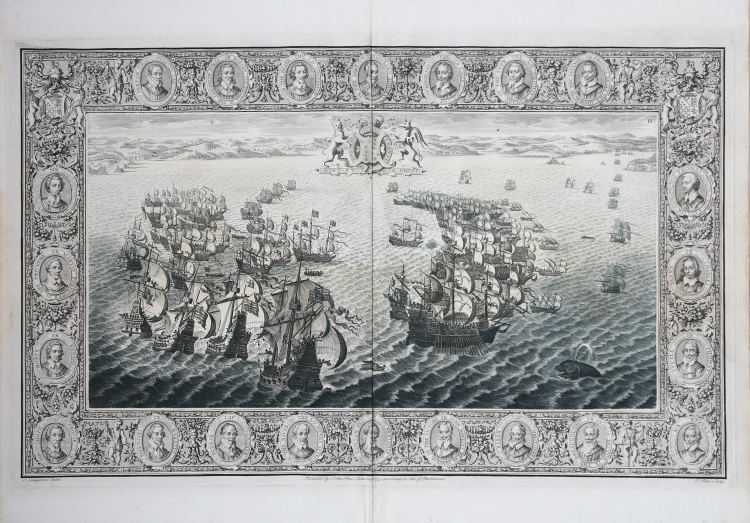



| Reference: | S2077 |
| Author | John PINE |
| Year: | 1739 |
| Measures: | 610 x 385 mm |


| Reference: | S2077 |
| Author | John PINE |
| Year: | 1739 |
| Measures: | 610 x 385 mm |
Etching printed in green/blue, taken from The tapestry hangings of the House of Lords: representing the several engagements between the English and Spanish fleets, in the ever memorable year MDLXXXVIII, with the portraits of the Lord High-Admiral, and the other noble commanders, taken from the life. To which are added, from a book entitled, Expeditionis Hispanorum in Angliam Vera Descriptio, A.D. 1588, done, as is supposed, for the said tapestry to be work'd after, ten charts of the sea-coasts of England, and a general one of England, Scotland, Ireland, France, Holland, &c. shewing the places of action between the two fleets; ornaments with medals struck upon the occasion, and other suitable devices. Also an historical account of each day's action, collected from the most authentic manuscripts and writers. By John Pine, engraver. London, MDCCXXXIX. Sold by J. Pine in Old Bond Street near Picadilly.
Shortly after the defeat of the Spanish “Armada” in 1588, Lord Howard of Effingham, commander of the British Fleet, commissioned Robert Adams to produce a series of charts representing the various phases of the action and then H.C. Vroom to produce a series of designs for tapestries, based on the work of Adams. They were woven by Francis Spiring of Haarlem.
Some years later, they were sold to James I and eventually came to furnish the walls of the House of Lords. All the tapestries, except one stolen at an earlier date and now lost, were burned in the fire that destroyed most of the Palace of Westminster in 1834. Pine's great work depicting this famous naval battle is therefore now of great historical importance.
Apart from the remarkable detail of the engraving and the wealth of invention in the various cartouches, the restrained use of coloured ink to print the plate surface produces a strikingly attractive effect, and represents a very early example of the colour-printing of illustrations.
|
T.Clayton, 'The English Print 1688-1802', New Haven and London, 1997, pp.87; Berlin Catalogue 1677.
|
John PINE
|
T.Clayton, 'The English Print 1688-1802', New Haven and London, 1997, pp.87; Berlin Catalogue 1677.
|
John PINE